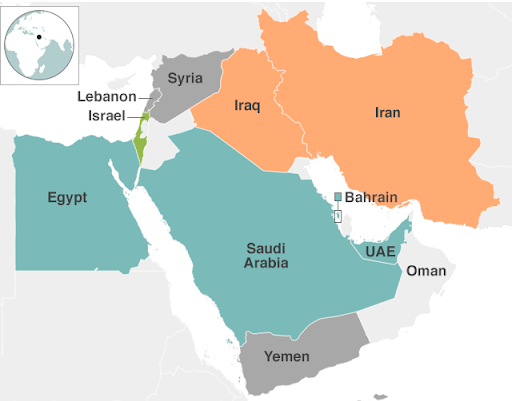Israel and Bahrain Diplomatic Ties | 19 Oct 2020
Why in News
Bahrain and Israel are signing a joint communique on the establishment of diplomatic, peaceful and friendly relations, as well as a number of memorandums of understanding in areas of mutual benefit.
Key Points
- Bahrain has a history of open politics and civil society movements, although rights have been curtailed in the past decade.
- The decision to normalise ties comes from the belief in the values of tolerance in a region whose people have suffered from wars and conflicts.
- The United Arab Emirates and Bahrain became only the third and fourth Arab states to agree to normalise ties with Israel, following Israel’s 1979 peace deal with Egypt and a 1994 pact with Jordan.
- Under the deal, Israel would suspend its plans to annex large parts of the occupied West Bank.
- The West Bank is sandwiched between Israel and Jordan. One of its major cities is Ramallah, the de facto administrative capital of Palestine.
- Israel took control of it in the Six-day Arab-Israeli war, 1967 and has over the years established settlements there.
- Impact on the USA:
- This is the second deal in 2020 after the Israel-UAE Peace Deal brokered by the USA. The recognition grants a diplomatic win to the USA President Donald Trump ahead of the Presidential election.
- The deal buys UAE a lot of goodwill in the US, where its image has been tarnished by its involvement in the Yemen war.
- Saudi Arabia made clear that it will not normalise ties without a resolution to the Palestinian issue despite signs of rapprochement.
- Concerns:
- For Palestine:
- The Palestinians have not embraced the USA’s vision. 86% of Palestinians believed the normalization agreements with the UAE and Bahrain served only Israel’s interests and not their own.
- For Palestinians, who long have relied on Arab backing in their struggle for independence, the announcement marked both a win and setback for the Israel-Palestine relations.
- While the deal halts Israeli annexation plans of the west Bank, the Palestinians have repeatedly urged Arab governments not to normalize relations with Israel until a peace agreement establishing an independent Palestinian state is reached.
- Shia-Sunni rifts in the region may get wide and violent.
- Saudi Arabia (Sunni) and Iran (representing Shia) have a long history of enmity. For decades, one of the main sources of instability in West Asia has been the cold war between Saudi Arabia and Iran.
- The Sunni-Shiite schism may also provoke violence between Muslims in such places as Pakistan, Nigeria and Indonesia.
- For Palestine:
- Indian Interest in West Asia: A peaceful and prosperous West Asia is necessary for India. Such deals between Arab Countries and Israel are having a positive impact for Indian interests in the region. Also, difficulty in balancing Arab countries and Israel will become easy. Indian interests include:
- Geopolitical: West Asia occupies an important position in international relations due to its geographical location and proximity to continents and countries South Asia, China, Central Asia, Europe, and Africa.
- Energy: The region is strategically significant due to its enormous energy resources, trade route links to different parts of the world.
- It is the world's largest oil-producing region accounting for 34% of world production, 45% of crude oil exports and 48% of oil proven reserves.
- Diaspora: Indian expatriates have constituted a substantial share of the regional labour market.
- Remittances from the region constitute a major chunk of total remittances to India.
Way Forward
- A balance between Shia and Sunni, between Iran and Arab, is key to any sustainable peace.
- The US may be a pre-eminent power in the Middle East, but Russia has made a space for itself, spending a lot less money. In recent years, China has indicated its willingness to play a larger role in this region.
- India should make its moves before this market and this extended neighbourhood come under the Chinese sphere of influence.
- A deal that could, if played right, open the doors for a changed geopolitical arrangement in the Middle East should have a stronger Indian footprint.

